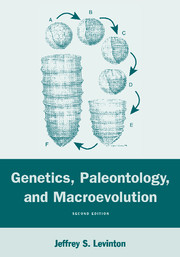Book contents
- Frontmatter
- Contents
- Preface to the First Edition
- Preface to the Second Edition
- 1 Macroevolution: The Problem and the Field
- 2 Genealogy, Systematics, and Macroevolution
- 3 Genetics, Speciation, and Transspecific Evolution
- 4 Development and Evolution
- 5 The Constructional and Functional Aspects of Form
- 6 Patterns of Morphological Change in Fossil Lineages
- 7 Patterns of Diversity, Origination, and Extinction
- 8 A Cambrian Explosion?
- 9 Coda: Ten Theses
- Glossary of Macroevolution
- References
- Author Index
- Subject Index
1 - Macroevolution: The Problem and the Field
Published online by Cambridge University Press: 14 January 2010
- Frontmatter
- Contents
- Preface to the First Edition
- Preface to the Second Edition
- 1 Macroevolution: The Problem and the Field
- 2 Genealogy, Systematics, and Macroevolution
- 3 Genetics, Speciation, and Transspecific Evolution
- 4 Development and Evolution
- 5 The Constructional and Functional Aspects of Form
- 6 Patterns of Morphological Change in Fossil Lineages
- 7 Patterns of Diversity, Origination, and Extinction
- 8 A Cambrian Explosion?
- 9 Coda: Ten Theses
- Glossary of Macroevolution
- References
- Author Index
- Subject Index
Summary
The science of life is a superb and dazzlingly lighted hall, which may be reached only by passing through a long and ghastly kitchen.
– Claude BernardThe Process and the Field of Macroevolution
The return of macroevolution. The field of macroevolution embraces the excitement of seeking an understanding of the breadth of life. We have long desired to know how best to describe the diversity of life's forms and to explain how and why this diversity came to be. No mystery is more intriguing than why we have amoebas and horses, or dandelions and palms. The child's first walk in a meadow, when the child sees flowers and butterflies for the first time, can inspire the same wonder in the most sophisticated biologist walking those same tracks many years later.
We return to this perspective from many quarters of biology and paleontology, after many decades of asking far more restrictive questions that tended to put the process of evolution under a microscope. But now we are stepping back, to take in the broader view. The advances in molecular genetics and developmental biology in recent years have only increased our confidence that the nature of living systems can be understood mechanistically; we can now imagine the possibility of describing the difference between organisms in terms of their genes, gene products, and spatial organization. Such descriptions were beyond our grasp even 10 years ago, but now they are at hand, if still in fragments. The large-scale collation of fossil data and a new understanding of the history of the earth have brought similar increases of confidence among geologists and paleontologists.
Information
- Type
- Chapter
- Information
- Genetics, Paleontology, and Macroevolution , pp. 1 - 31Publisher: Cambridge University PressPrint publication year: 2001
Accessibility standard: Unknown
Why this information is here
This section outlines the accessibility features of this content - including support for screen readers, full keyboard navigation and high-contrast display options. This may not be relevant for you.Accessibility Information
- 1
- Cited by
